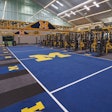Copyright 2018 Knoxville News-Sentinel Co.
All Rights Reserved
Knoxville News-Sentinel (Tennessee)
ATLANTA — Walk outside the College Football Hall of Fame and onto Marietta Street and you can't miss it — Vanderbilt quarterback Kyle Shurmur on a billboard, proclaiming him "Nashville's next big star" and telling folks to head to vucommodores.com for tickets.
Anyone attending SEC Media Days this week will see it. And yes, the correct first reaction is: "Hey, Vanderbilt spent some money on athletics!"
The second reaction is to continue pushing an agenda that must be pushed until it becomes reality. So let's push it again. It's going to take more time, and relentless refusal to accept the sidestepping of the folks who are getting rich off college athletics and claiming college athletes getting paid is too complicated to work. Or too problematic. Or contrary to the spirit of amateurism that guides this multi-billion dollar industry.
Eventually the Olympic model will happen, because it's the right thing morally; because it will allow college athletics to operate virtually the same as it has for decades from a product and fan standpoint; because it's the only way for athletes to be compensated without massively overhauling a system that does indeed provide significant opportunities for athletes in "non-revenue" sports. The people who run this industry don't want this to become minor league professional sports, and neither do I, and neither should you.
I just want a college football quarterback like Shurmur, or a women's basketball star like A'ja Wilson, or a college golfer, tennis player or rower to have the freedom to get paid for autographs. Or to be able to do a commercial for a local auto dealer and get some pocket money — maybe even a nice car to drive around campus.
This actually would be quite painless to implement. Allowing athletes to participate in a free market — like any other college student in any field — did not ruin the Olympics. It wouldn't ruin college sports. It would allow it to continue essentially the same, except that some of the money that moves under the table would be out in the light of day.
SEC cutting fat checks, getting ready for gambling
And that's why it's frustrating to come to events like this and hear about $597 million in revenue distributed from the SEC to its schools last year — more than $40 million per school — and to consider what legalized gambling might mean for future revenue, and to wonder when SEC quality control coaches will hit $1 million a year, and to hear nothing about a plan to make things right.
SEC Commissioner Greg Sankey did address gambling and the possibility of formalized "availability reports" on SEC football players in the future, along with the idea of investing in the analysis of games to watch for funny business. This is a good idea, would have been a good idea decades ago and should include a close eye on game officials.
Also, it's a reminder that college athletics will benefit financially from the expected uptick in gambling on college athletics. More eyeballs, more interest.
Some will find this unsavory, but gambling on college athletics — and point shaving and other ill effects — is not new. Neither is the payment of players beyond scholarship, room and board. Neither is the incredible waste of time and resources trying to punish schools for violating NCAA rules. The Olympic model would chop chunks out of that NCAA rule book.
'Name, image and likeness'
NCAA President Mark Emmert did tell the Associated Press in May that the Olympic model is "well deserving of serious consideration," and I hope that was more than just an empty comment meant to placate. Sankey did not get into athlete compensation in the six questions he took at SEC Media Days, but he was asked by Mike Golic in May on ESPN Radio about the Olympic model.
"People talk about something called 'name, image and likeness,'" Sankey said. "I'm waiting for everyone to define how that is operationalized. But, fundamentally, it goes back to this phrase 'student-athlete.' People take shots at it and say it was created by (former NCAA executive director) Walter Byers. Did you know we had 31 graduate patches in the national championship game? That means 31 out of about 200 players on that field already had earned bachelor's degrees."
Sankey is a highly intelligent person and he's going to be a successful SEC commissioner. He'll keep the league humming and will earn his salary (last reported at $1.9 million in 2016). But that answer is exactly why people get angry. Getting this "operationalized" would be no problem at all. And changing the subject to what "student-athlete" means is a lawyerly bailout.
It's like bringing up the platforms these college athletes have, or the value they get from their college educations. The argument here is not that there aren't great benefits to playing college athletics, and it's not that college athletes are being mistreated.
Shurmur is going to walk away from Vanderbilt with a prized degree, for free, and with exposure and development that will give him a chance at the NFL. If Vanderbilt wants to use him to help sell Vanderbilt, fine.
But there's way too much money in this industry to deny Shurmur the right to put his own face on the window of a sports card shop and make a couple of hundred bucks signing pictures one afternoon. And we're way past, "Gosh, maybe this is something we can talk about someday."
Reach Joe Rexrode at [email protected] and follow him on Twitter @joerexrode.
Read More of Today's AB Headlines
Subscribe to Our Daily E-Newsletter
Terms and Conditions Privacy Policy































